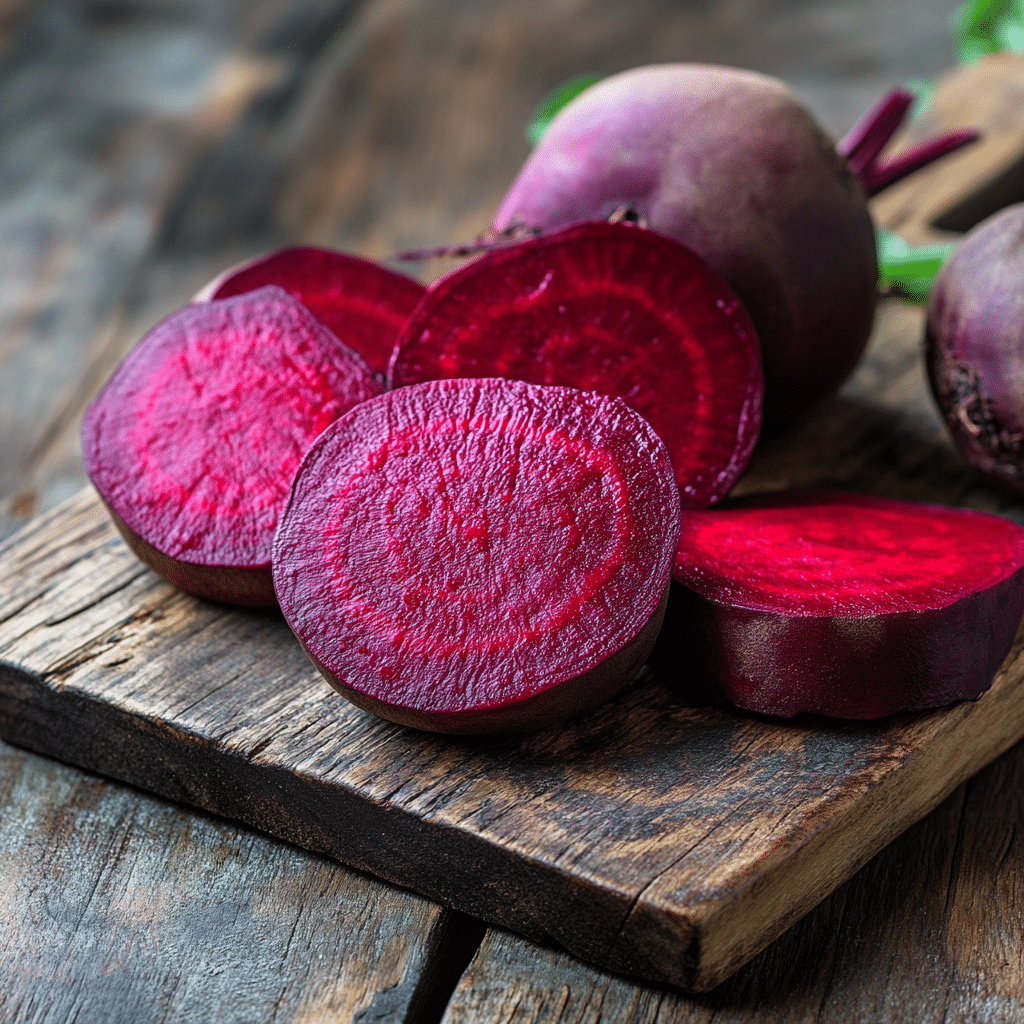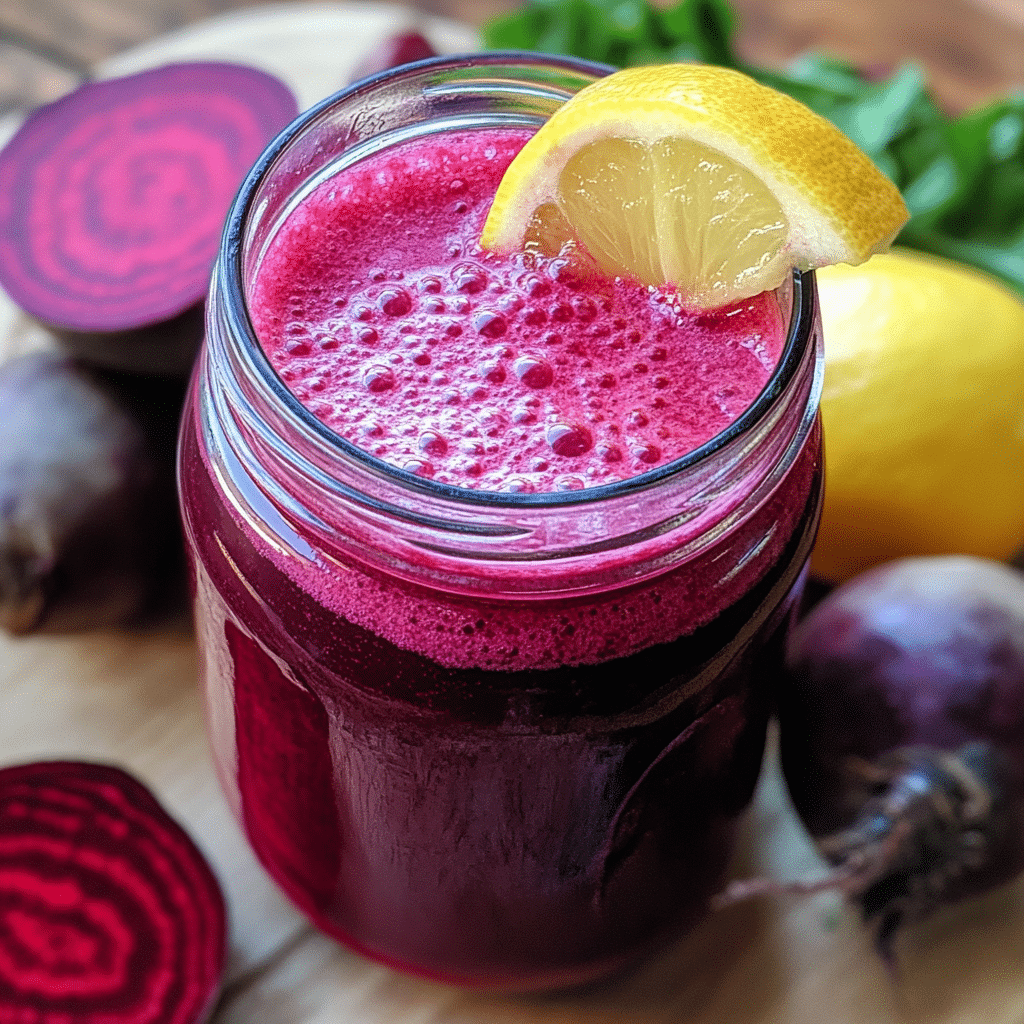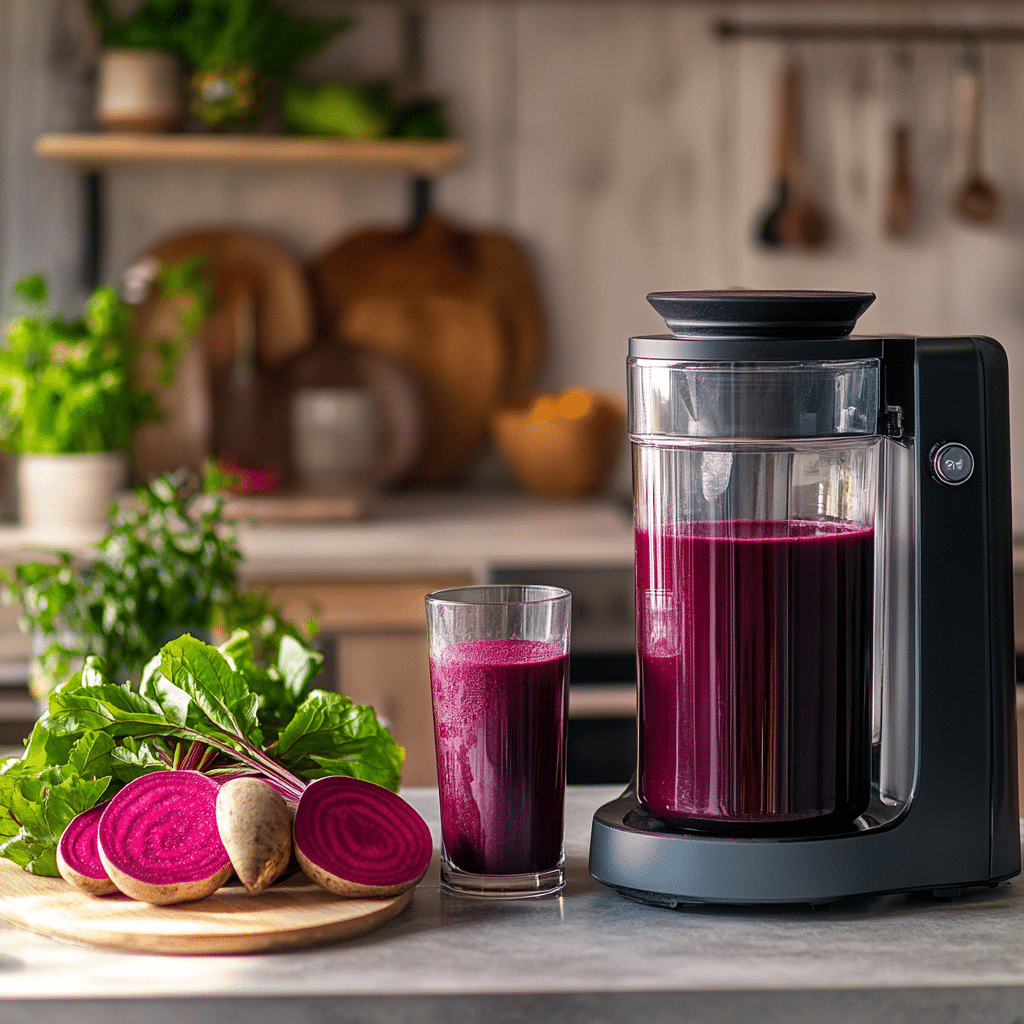Organic beetroot juice has quietly earned its place as a superfood staple in modern wellness routines. Whether you’re sipping it to lower blood pressure, boost stamina, or simply enjoy its earthy taste, this ruby-red drink is packed with powerful nutrients. With a rise in popularity among health-conscious individuals and athletes, it’s no surprise that questions like “Is it safe to drink beet juice daily?” or “Which beetroot juice is the best?” are trending.
In this guide, we’ll uncover everything you need to know about organic beetroot juice—its health benefits, how often to drink it, the best brands, and even how to make it at home. You’ll also learn when to drink it for optimal results, who should be cautious, and how to choose the right organic option.
Looking for inspiration? Try our Detox Water Recipes to complement your beet juice routine.
Table of Contents
ToggleWhat Is Organic Beetroot Juice?
What Qualifies as “Organic” in Beetroot Juice?
Organic beetroot juice is made from beets grown without the use of synthetic pesticides, herbicides, GMOs, or artificial fertilizers. To carry the “organic” label, farmers must follow strict agricultural practices that maintain soil health and avoid chemical residues.
Certified organic juices typically undergo third-party inspections to meet USDA or international standards. This certification ensures that what you’re drinking is pure and free of contaminants, making it a safer choice for long-term use.
Not all beet juices labeled “natural” are truly organic, so look for labels like USDA Organic or Certified Organic to be sure.
How Is Organic Beetroot Juice Made?
The process starts with washing and cold-pressing organically grown beets to extract the juice while retaining nutrients like betalains, nitrates, potassium, and antioxidants. Cold-pressing is preferred over heat pasteurization because it preserves the natural compounds more effectively.
Some organic juices are raw and unpasteurized, while others are lightly pasteurized for safety. You might also find blends that include other organic vegetables or fruits for enhanced flavor and benefits.
Check out our nutrient-packed Chia Seed Smoothie for another great addition to your organic drink rotation.
Print
Organic Beetroot Juice: Benefits, Best Brands & How Often to Drink It
5 Stars 4 Stars 3 Stars 2 Stars 1 Star
No reviews
A nutrient-dense juice made from organic beets and optional add-ins like apple, carrot, ginger, and lemon. Perfect for boosting stamina, supporting detox, and improving cardiovascular health.
- Total Time: 10 minutes
- Yield: 2 servings 1x
Ingredients
2 medium organic beets, peeled and chopped
1 organic apple (optional, for sweetness)
1 small organic carrot (optional, for nutrients)
½ inch fresh ginger root (optional, for digestion)
1 cup cold filtered water
Juice of ½ organic lemon
Instructions
1. Wash and prep all your produce thoroughly.
2. Peel and chop the beets into small cubes for easier blending.
3. Add the beets, apple, carrot, ginger, and water into a high-speed blender.
4. Blend until smooth, about 1–2 minutes.
5. Strain through a fine mesh or cheesecloth into a glass jar or jug.
6. Stir in the lemon juice, then serve immediately or refrigerate.
Notes
Drink the juice immediately after making to preserve nutrients like vitamin C and nitrates.
Lemon helps enhance iron absorption—especially useful if drinking for anemia support.
If the earthy flavor is too strong, blend with organic cucumber or green apple juice for balance.
Store in airtight glass containers in the coldest part of the fridge and consume within 2–3 days.
Consult your doctor before use if you have low blood pressure, kidney stones, or take medications.
- Author: Jessica Lupone!
- Prep Time: 10 minutes
- Cook Time: 0 minutes
- Category: Beverage
- Method: Blended
- Cuisine: Health
- Diet: Vegan
Nutrition
- Serving Size: 1 cup
- Calories: 90
- Sugar: 14g
- Sodium: 130mg
- Fat: 0.3g
- Saturated Fat: 0g
- Unsaturated Fat: 0.2g
- Trans Fat: 0g
- Carbohydrates: 22g
- Fiber: 3g
- Protein: 2g
- Cholesterol: 0mg
Health Benefits of Organic Beetroot Juice
Why Beetroot Juice Is a Nutritional Powerhouse
Beetroot juice isn’t just eye-catching with its deep red hue—it’s also a nutritional beast. Here’s a quick glance at what makes organic beetroot juice a favorite among health enthusiasts:
| Nutrient | Health Role |
|---|---|
| Nitrates | Converts to nitric oxide, relaxing blood vessels |
| Betalains | Natural antioxidants and anti-inflammatory agents |
| Potassium | Essential for muscle function and electrolyte balance |
| Folate (Vitamin B9) | Supports heart and cell health |
| Vitamin C | Boosts immunity and collagen production |
| Iron | Aids in oxygen transport and prevents fatigue |
Drinking it regularly may contribute to better overall well-being by delivering a broad spectrum of vitamins, minerals, and phytonutrients—all from a single glass.
Top Science-Backed Benefits: From Blood Pressure to Brain Health
1. Lowers Blood Pressure Naturally
Organic beetroot juice is rich in dietary nitrates, which help your body produce nitric oxide—a compound that relaxes and dilates blood vessels. This results in improved circulation and a reduction in blood pressure, especially for those with hypertension.
Clinical studies have shown that even a single glass of beet juice can lower systolic blood pressure within hours. For long-term benefits, daily intake has been linked to sustained improvement in vascular health.
2. Boosts Exercise Performance
Endurance athletes love beet juice for good reason. The nitrates help improve oxygen use during physical activity, making workouts feel easier and extending stamina. Drinking beetroot juice 2–3 hours before a workout is said to improve time-to-exhaustion and overall performance.
Discover great ideas like our Jeera Water Recipe for more natural ways to support circulation and energy.
3. Supports Liver Detox and Digestion
Beetroot juice stimulates the production of bile and supports liver enzyme function, helping your body flush out toxins. The antioxidants in beets also help protect the liver from oxidative stress.
If you’re looking for a natural digestive aid, adding beet juice to your morning routine may help reduce bloating and improve nutrient absorption.
4. Enhances Brain Health and Focus
The nitric oxide boost from beets also enhances blood flow to the brain. Some studies suggest that beetroot juice may improve cognitive function and delay the onset of age-related mental decline, making it a potential ally for memory and mental clarity.
5. May Help Combat Inflammation
Thanks to betalains, organic beetroot juice has strong anti-inflammatory effects. Regular consumption may ease symptoms associated with chronic inflammation, such as arthritis or joint pain.

Is It Safe to Drink Organic Beetroot Juice Daily?
Recommended Daily Intake and Dosage
Yes, it’s generally safe to drink organic beetroot juice daily—if consumed in moderation. Most health experts recommend a daily intake of about 250 ml to 300 ml (roughly 8–10 ounces) of beetroot juice for healthy adults.
If you’re drinking beet juice for specific benefits like lowering blood pressure or enhancing athletic performance, this is the ideal dosage supported by clinical studies.
Dosage Guidelines by Use Case:
| Goal | Recommended Dosage |
|---|---|
| Lowering blood pressure | 250 ml/day |
| Athletic performance | 250–300 ml 2–3 hours before workout |
| Liver detox or general wellness | 150–250 ml/day |
| Iron support for anemia | 200 ml/day with citrus (to aid absorption) |
Note: If you’re just starting, ease into beet juice with half the dose and gradually increase over a week to avoid digestive discomfort.
Side Effects and Precautions to Know About
While beetroot juice is healthy, consuming too much too fast may lead to side effects. Here’s what to watch out for:
1. Beeturia
Don’t panic if your urine or stool turns red or pink. This harmless effect, known as beeturia, happens in about 10–14% of people and is due to the natural pigments in beets.
2. Low Blood Pressure
Beet juice is known toIf you’re taking blood pressure medication, be sure to consult your doctor before adding beet juice to your regular routine.
3. Kidney Stones Risk
Beets are rich in oxalates, which may contribute to kidney stone formation in individuals who are sensitive to them. People with a history of kidney stones, particularly calcium oxalate stones, should avoid large or frequent amounts.
4. Stomach Upset or Bloating
Some individuals may experience temporary bloating, cramping, or gas when starting beetroot juice—especially if consumed on an empty stomach.
How Often Should You Drink Organic Beetroot Juice?
Frequency Guidelines by Health Goal
The right frequency for drinking organic beetroot juice depends on what you’re trying to achieve. While daily consumption is safe for most, some goals only require a few servings a week.
Here’s a breakdown based on common wellness intentions:
| Health Goal | Recommended Frequency |
|---|---|
| Lower blood pressure | Daily (250 ml) |
| Detox & liver support | 3–4 times per week |
| Pre-workout stamina | 2–3 hours before training |
| General wellness | 3–5 times per week |
| Anti-inflammatory support | Every other day |
Keep in mind, consistency is key. Whether you’re drinking it for cardiovascular health or post-workout recovery, regular intake ensures your body reaps the full benefits of its nitrates and antioxidants.
Tips for Creating a Weekly Beet Juice Routine
1. Alternate With Other Juices
To avoid beet fatigue or oxalate overload, rotate beet juice with other functional drinks like lemon balm tea, chia smoothies, or detox waters.
Learn more about cleansing drinks in our Detox Water Recipes.
2. Combine With Morning or Pre-Workout Rituals
Drinking beet juice first thing in the morning or before your workout can enhance energy and nitric oxide levels. If you’re not a morning person, try pairing it with lunch to aid digestion.
3. Track Your Body’s Response
Everyone reacts differently. Use a journal or health app to monitor how your body responds over a few weeks—energy levels, digestion, and mood are good metrics.
4. Don’t Overdo It
Just because it’s healthy doesn’t mean more is better. Stick to recommended portions and take occasional breaks if drinking it daily. This gives your system time to reset and ensures balanced nutrient intake.
Best Ways to Drink Organic Beetroot Juice for Maximum Benefits
Drinking It Raw vs. Mixing with Other Juices
1. Pure Organic Beetroot Juice (Undiluted)
Drinking beetroot juice raw and undiluted delivers the most concentrated dose of its nutrients—especially nitrates, betalains, and antioxidants. It’s ideal if your goal is lowering blood pressure, boosting stamina, or enhancing brain function.
However, the bold, earthy taste can be overpowering for those trying it for the first time. Start small (around 100 ml) and build up your tolerance.
2. Blending with Other Organic Juices
Combining beet juice with other organic vegetables or fruits can improve taste and add synergistic benefits:
| Mix-In | Added Benefit |
|---|---|
| Carrot | Eye health & sweetness |
| Apple | Antioxidants & improved taste |
| Ginger | Anti-inflammatory & digestion boost |
| Lemon | Enhances iron absorption |
| Celery | Natural electrolytes |
Try this powerful combo: Beet + Carrot + Apple + Lemon for an energizing morning tonic.
When Is the Best Time to Drink It?
1. Morning on an Empty Stomach
Drinking organic beetroot juice first thing in the morning boosts nutrient absorption and activates detoxification early in the day. It’s perfect for jumpstarting your metabolism and reducing inflammation from the get-go.
2. 2–3 Hours Before a Workout
Beet juice’s nitrate load takes about 2–3 hours to convert into nitric oxide in the body. That’s when blood flow, stamina, and muscle oxygenation reach their peak—ideal for endurance training, running, or high-intensity workouts.
3. Before Bed? Not Recommended
Avoid consuming beet juice late at night. It’s mildly stimulating and can interfere with sleep due to its natural sugars and energizing effects.
Looking for other functional drinks?
Don’t miss our revitalizing Jeera Water Guide for circulation and digestion support.

Which Beetroot Juice Is the Best?
Comparing Top Store-Bought Organic Beetroot Juice Brands
If you’re not into juicing at home, don’t worry—there are excellent store-bought options available. The best organic beetroot juice brands share common qualities: they’re cold-pressed, USDA certified organic, and free from artificial additives.
Here’s a comparison of top-rated brands in the U.S.:
| Brand | Type | Notable Features | Average Price |
|---|---|---|---|
| Lakewood Organic Pure Beet Juice | 100% organic beetroot juice | Glass bottled, not from concentrate | $8.99 (32 oz) |
| Biotta Beet Juice | Organic, fermented | Rich in probiotics | $7.99 (16.9 oz) |
| Beet It Organic Sport Shot | Beet juice concentrate | High-nitrate, athlete-focused | $3.99 (2.4 oz shot) |
| R.W. Knudsen Organic Beetroot Juice | Pasteurized juice | Non-GMO Project Verified | $4.99 (32 oz) |
| Suja Organic Uber Greens (with beet) | Blend | Organic beetroot with greens, apple, celery | $3.99 (12 oz) |
Each of these brands delivers slightly different benefits, so the “best” one depends on your goals. For athletes, go with Beet It Sport Shot; for gut health, try Biotta; and for daily health maintenance, Lakewood Organic is a solid pick.
How to Choose the Best Option for You
When selecting an organic beetroot juice, keep these key points in mind:
✅ Check the Label for Certifications
Look for seals like:
- USDA Organic
- Non-GMO Verified
- Cold-Pressed or Not From Concentrate
These markers ensure higher quality, fewer additives, and better retention of nutrients.
✅ Avoid Added Sugars & Fillers
True organic beetroot juice shouldn’t include cane sugar, preservatives, or artificial colors. If you see “flavorings” or “natural sweeteners” on the label, put it back.
✅ Pick the Right Format
If you’re always on the go, organic beetroot juice shots are convenient and deliver high nitrate doses in seconds. If you’re juicing regularly at home, bulk glass-bottled options are more economical.
Pro Tip: Always refrigerate after opening and drink within 5–7 days to maintain freshness and potency.
DIY Organic Beetroot Juice Recipe
Step-by-Step Recipe You Can Make at Home
Making organic beetroot juice in your kitchen is surprisingly simple and cost-effective. Plus, you control the freshness and flavor—no preservatives, no added sugars, and no compromises.
Ingredients:
- 2 medium organic beets (peeled & chopped)
- 1 organic apple (optional, for sweetness)
- 1 small organic carrot (optional, for added nutrients)
- ½ inch fresh ginger root (optional, for digestion)
- 1 cup cold filtered water
- Juice of ½ organic lemon (to boost iron absorption)
Instructions:
- Wash and prep all your produce thoroughly.
- Peel and chop the beets into small cubes for easier blending.
- Add the beets, apple, carrot, ginger, and water into a high-speed blender.
- Blend until smooth (about 1–2 minutes).
- Strain through a fine mesh or cheesecloth into a glass jar or jug.
- Stir in the lemon juice, then serve immediately or refrigerate.
You can also use a cold-press juicer if available, which will retain even more of the juice’s nutrients and enzymes.
Tips to Enhance Taste and Nutrient Retention
✅ Drink Immediately After Juicing
Nutrients—especially vitamin C and nitrates—begin to degrade shortly after juicing. Drink it fresh to get the full benefits.
✅ Add Citrus for Iron Boost
Lemon not only adds a pleasant tang but also helps your body absorb more iron from the beets—especially important if you’re drinking beet juice for anemia or energy.
✅ Balance the Earthy Taste
If the taste is too intense, blend it with:
- Organic cucumber juice (for a hydrating touch)
- Green apple or orange juice (for natural sweetness)
- A pinch of Himalayan salt (to boost electrolytes)
Discover another great homemade drink for detox in our Detox Water Recipes section.
How to Store Organic Beetroot Juice Properly
Refrigeration and Shelf Life Tips
Freshly made organic beetroot juice is perishable—treat it like produce, not soda. If you store it improperly, it can lose nutrients quickly or even go bad.
Here’s how to store it the right way:
✅ Use Airtight Glass Containers
Always transfer juice to sterilized glass jars with airtight lids. Avoid plastic, which can leach chemicals and doesn’t seal in freshness as well.
✅ Store in the Coldest Part of the Fridge
Place your juice in the back of the refrigerator, where the temperature is most stable and coldest.
✅ Ideal Shelf Life: 2–3 Days (Max 5)
Drink your beetroot juice within 48 to 72 hours of juicing. After 3 days, nutrient loss increases, and the flavor may turn stale or sour. For longer life, freeze in small glass containers—but note that freezing slightly reduces vitamin C levels.
✅ Avoid Repeated Opening
Exposure to oxygen accelerates oxidation. Only open when you’re ready to drink. Pour into a glass rather than drinking from the bottle to avoid introducing bacteria.
Signs Your Beetroot Juice Has Gone Bad
Be alert for these spoilage signs:
- Fizzy or foamy surface
- Sour, yeasty, or vinegar-like smell
- Color change from deep red to brownish or dull
- Taste is off or unusually sour
When in doubt, toss it out. Spoiled beet juice may contain harmful bacteria that can upset your stomach.
Don’t miss our guide to other gut-friendly drinks like Jeera Water to keep your digestion in balance.

Who Should Avoid Organic Beetroot Juice?
Medical Conditions and Drug Interactions to Consider
While organic beetroot juice is a superfood for many, it’s not ideal for everyone. In fact, certain medical conditions and medications can make regular consumption risky.
⚠️ 1. People with Low Blood Pressure (Hypotension)
Beet juice naturally lowers blood pressure thanks to its nitrate content. If you’re already prone to low blood pressure or take antihypertensive medications, beet juice can make your blood pressure drop dangerously low.
⚠️ 2. Kidney Stone Sufferers
Beets are rich in oxalates, which can contribute to calcium oxalate kidney stones. If you’ve had stones before or are on an oxalate-restricted diet, consult your doctor before adding beetroot juice to your daily routine.
⚠️ 3. Individuals on Blood Thinners
Beetroot juice contains vitamin K, which can interfere with anticoagulant drugs like warfarin. While not as rich in K as leafy greens, regular intake may still pose a risk over time.
⚠️ 4. People with Irritable Bowel Syndrome (IBS)
Beet juice may trigger digestive discomfort such as bloating or gas due to its FODMAPs. If you’re sensitive, start with small servings or avoid it altogether.
⚠️ 5. Pregnant or Breastfeeding Women
In moderate amounts, beet juice is generally safe. However, due to its blood pressure-lowering effect and limited studies on high-nitrate foods in pregnancy, it’s best to speak to a healthcare provider before frequent use.
When to Consult Your Doctor
If any of the following apply to you, get professional guidance before drinking beetroot juice regularly:
- You take prescription medication for heart, kidney, or liver health
- You have a history of kidney stones or gastrointestinal disorders
- You experience dizziness or fatigue after drinking beet juice
- You’re managing a chronic health condition
Conclusion
Organic beetroot juice is more than a trendy health drink—it’s a nutrient-packed powerhouse that supports cardiovascular health, boosts stamina, enhances detoxification, and sharpens brain function. Whether you’re an athlete, a busy parent, or someone just looking to eat clean and feel better, adding beetroot juice to your diet a few times a week can make a real difference.
Remember to choose certified organic brands, store your juice properly, and stay mindful of your body’s responses. Not everyone needs to drink it daily, and certain health conditions may require caution—but for most, it’s an easy, natural, and effective way to support whole-body wellness.
Looking for more natural health drinks?
Don’t miss our detox favorite: Detox Water Recipes
For more recipes Follow me in our Social media
Facebook: https://www.facebook.com/profile.php?id=61573913076847
Pinterest: https://www.pinterest.com/momandgrandmacooks/
Medium: https://medium.com/@momandgrandmacooks
Frequently Asked Questions
What is organic beetroot juice good for?
Organic beetroot juice is known for improving blood pressure, boosting stamina, supporting liver detox, and enhancing brain function. Rich in nitrates, antioxidants, and anti-inflammatory compounds like betalains, it’s used to promote heart health, aid digestion, and increase oxygen delivery to muscles during workouts. Its natural sweetness and deep color also make it a favorite in detox and cleansing routines.
Is it safe to drink beetroot juice daily?
Yes, drinking beetroot juice daily is generally safe for most people when consumed in moderate amounts (about 250–300 ml per day). However, it may not be suitable for everyone. Individuals with low blood pressure, kidney stones, or those on certain medications should consult a doctor before adding it to their routine. Beeturia (red urine or stool) is common but harmless.
How often should you drink organic beetroot juice?
For most people, drinking organic beetroot juice 3–5 times a week provides steady benefits. If you’re targeting specific goals like lowering blood pressure or improving athletic performance, daily consumption is more effective. Just be sure to start with smaller amounts and monitor how your body responds.
Which beetroot juice is the best?
The best beetroot juices are those that are USDA certified organic, cold-pressed, and free from added sugars or preservatives. Top picks include:
Lakewood Organic Pure Beet Juice (best overall)
Biotta Beet Juice (fermented & gut-friendly)
Beet It Sport Shot (ideal for athletes)
R.W. Knudsen Organic Beetroot Juice (budget-friendly)
Always check the label for certifications and ingredients to ensure purity and quality.








